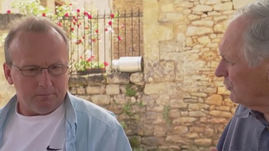Teachers' Domain - Digital Media for the Classroom and Professional Development
User: Preview

Source: The Human Spark: "Becoming Us"




Major funding for The Human Spark is provided by the National Science Foundation, and by the Alfred P. Sloan Foundation. Additional funding is provided by the John Templeton Foundation, the Cheryl and Philip Milstein Family, and The Winston Foundation.
ALAN ALDA But isn’t it your sense that what made us able to outlast or to supersede the Neanderthals was a social change, not a technological change, was this ability to organize ourselves socially that they didn’t have.
RANDALL WHITE Yeah, I know. I think the social part of it is very important, but I don’t think you can separate society from technology. I think the fact that you have innovations that spread quickly, that you have information flow between groups is a very social kind of phenomenon. Some people think that it may be just as simple as a matter of population numbers, that Neanderthals were really small, lived in small groups, isolated one from the other, and that the lines of communication weren’t open, so that when something new was, they glommed onto something new, it didn’t spread like wildfire. But you really get the impression with moderns that once somebody invents something, everybody knows about it.
 Loading Standards
Loading Standards